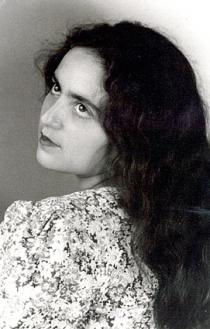My aunt Tzyupa at her jubilee.
Matus and Riva Strizhevskiy, the parents of my aunt Tsyupa (my uncle Isaac's wife) played a very special role in my life. Before the war they were living in a small house in the outskirts of Kiev. When they returned from evacuation they found their house destroyed during the war. They received a small apartment in Chokolovka, a distant neighborhood in Kiev. My aunt's parents were very religious. I visited them for the first time when I was ten years old after I returned to Kiev after the war. I saw my grandfather Matus put on his ritualistic clothing: little boxes on his head (tfilin) and striped cloth (thalesz). I heard him praying. I understood that they belonged to a different world. I wish I had paid more attention to such things. But at that time such was my understanding that they belonged to the outdated world and I took no interest in them. They were very patient and wise in their attitude towards non-religious people. I visited them at Pesach every year. I usually came in the evening after work.
They had many books in the language that I didn't know. Now I understand that they were religious books in Yiddish. Many of these books were given to them by my uncle Isaac. Many of them were found in the attics of the houses where Jews had been living before the war.
I have one of the brightest memories of Seder diner at Pesach in this family in the middle 1950s. I was there and so was Isaac and his family and other relatives. Grandfather Matus sat ceremoniously at the head of the table. He said a prayer and we all drank some wine. It was a long ritual according to all rules. There was a big book on the table in front of my grandfather. He read an excerpt from it and we had to take a bite of greens or an onion or something else. Then they ceremoniously removed a beautiful cloth from the dish with matzah. Then we ate delicious dinner. I remember chicken broth with matzah and kosher chicken. Their daughter (my aunt Tsypa) bought chicken at the market and went to Podol where it was still possible to find a shoihet to slaughter the chicken. Matus and Riva would have rather refused from food than have something non-kosher. They kept kitchen utensils for meat and dairy products separately in their house. They had special dishes for Pesach. There was no bread in this house at Pesach. They checked and cleaned everything before Pesach.
My aunt Tsyupa's parents, Matus and Riva Strizhevskiy didn't like the Soviet power. They called Party officials "these bandits". I spent every Pesach with them before grandfather Matus died in 1958. They sent me an invitation through Isaac. I didn't go to his funeral because I was ill at that time. I know that he was buried according to the Jewish tradition, but I don't know where. Riva died in the early 1960s. She was buried according to the Jewish tradition as well. There was no coffin. A rabbi from the synagogue in Schekavitskaya street (the only functioning synagogue even during the most difficult times) was at the funeral to say the prayer. Now I look after Riva's grave. I failed to find the grave of grandfather Matus.
Tsyupa was born in 1907. She finished a secondary school. She married my father's brother Isaac in 1929. She worked as a typist and a secretary in various offices.
In 1938 my uncle Isaac married a Jewish woman from a very religious family. Her name was Tsyupa. In 1929 their son Marek was born. Their son Dania was born in 1937 and their younger daughter Rina was born in 1939. Isaac was summoned to the army in the first days of the war in 1941. He was sent to the Kiev food supplies center. In the first months of the war this center was near the front, but after half of its stuff was killed or wounded at the Gotiy station, it was transferred to the Gorky station in Russia. He served there until the beginning of 1946. Isaac's wife and their children and parents were in the evacuation in Tashkent.
I have always been near Tsyupa and uncle Isaac. Their older son Marek fell ill and died in the early 1970s. Their son Dania and daughter Rina and their families moved to the US in the early 1980s. In few years Dania and his wife got in a car accident. His wife died and Dania is in a special hospital. He doesn't recognize anyone, doesn't remember and cannot move. In 1983 my uncle died and his wife said that everything associated with him was very dear for her meaning his collection. But this was a different time and there was no fear of an arrest. Tsyupa lives in America now with her daughter and granddaughter. She gave my uncle collection to the people that had helped her to prepare all necessary documentation for the departure. I don't know what happened to the collection. I guess it might have been sold out.
I used to visit her before she left. I loved her. She said to me before she left "There is one thing in my life I am sorry about - that is that I sent you to the children's home". I replied that it was all right with me. I didn't mind and I liked it at the children's home.









